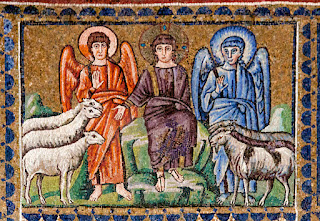Luke 2, 41-52
Every year his [Jesus’] parents went to Jerusalem for the feast of the Passover. And when he was twelve years old, they took him with them. Now after they had gone there and fulfilled the custom during the days of the feast, they set off on their way home. But the boy Jesus remained behind in Jerusalem. His parents did not know this; they thought he was among the company of the travelers. After a day’s journey, they missed him among their friends and relations. When they did not find him, they returned to Jerusalem to look for him.
After three
 |
| Durer |
And when they saw him, they were taken aback, and his mother said to him, “My child, why have you done this to us? Behold, your father and I have been searching for you in great distress.”
And he said to them, “Why did you look for me? Did you not know that I must be and live in that which is my Father’s?”
But they did not understand the meaning of the words he spoke to them. And he went down with them again to Nazareth and followed them willingly in all things.
And his mother carefully kept all these things living in her heart. And Jesus progressed in wisdom, in maturity and grace [favor] in the sight of God and man.
2nd Epiphany
January 14, 2018
Luke 2:41-52
For perhaps long periods of time the stream of our life flows smoothly. Then suddenly something unexpected happens—a great event, a loss, a chance encounter, and something new breaks forth.
In today’s reading, this moment in the life of the young Jesus is just such a moment. It is a kind of second birth. For three days he was cocooned in the Temple as His soul was being born. The child is becoming a man. Things can no longer be what they once were. For a moment, the light flares up in great promise, awakening both fear and hope. The mother ponders this in her heart. But His parents’ grief and confusion over the loss of the sweet, uncomplicated child will ultimately be a gain for all of humanity.
But it is not yet time. The Spirit Child has a further path before him. And so he covers the flame again. He goes home in humble submission to his earthly parents, to grow, to progress, to mature. The poet expresses this moment:
I cover the divine flame in my heart
for if I turned God loose from my house
the earth would reveal to your eyes what mine always see—
existence is a lamp, and I …
the oil it
burns.*
We, too, are nurturing a spirit child. He is brought to birth in prayer, in the Act of Consecration of Man. We hear Him speak of what belongs to the Father. We don’t always understand. But we ponder in our hearts. And we carry Him home, and out into the world with us where we, too, ‘progress in wisdom, in maturity and grace in the sight of God and man.’ Luke 2: 52.
*“The Oil It Burns”, by Kabir, in Love Poems from God, Daniel Ladinsky, p. 234.
















